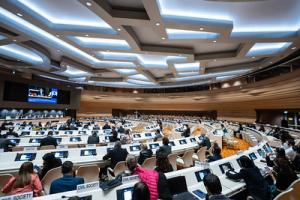
How to build back better from the coronavirus disease (COVID-19) while advancing the full implementation of the 2030 Agenda for Sustainable Development in the UNECE Region? Around 1000 key stakeholders including governments, UN agencies, intergovernmental organisations, business representatives and civil society organisations gathered in Geneva, in a hybrid format, at the 2022 Regional Forum on 6 and 7 April to discuss this overarching and pressing question.
The eight peer learning roundtables and the Forum’s plenary sessions aimed to create spaces for solution-oriented dialogues and highlight best practices with the aim to ensure the recovery has the Sustainable Development Goals at its very heart. Furthermore, pre-meetings for civil society, business, parliamentarians, and youth provided an early opportunity for participants to share experiences and introduce and discuss their messages at the Regional Forum, thereby identifying priorities and distilling a common vision.
A total of 35 side events on issues, challenges and opportunities related to the SDGs under in-depth review or to the main theme of the Regional Forum also provided a platform for various stakeholders to share their experience.
The Regional Forum was organized by UNECE in close cooperation with regional UN entities.
New challenges for the region and beyond
While the COVID crisis has already led to setbacks in many areas of the sustainable development agenda, many speakers referred to the new challenges for the region and beyond condemning the ongoing war in Ukraine.
The Chair, H.E. Mr. Edil Baisalov, Deputy Chairman of the Cabinet of Ministers of Kyrgyzstan stated in his opening speech that “there can be no sustainable development without peace and no peace without sustainable development, as enshrined in the preamble of the 2030 Agenda”.
At the same time, he stressed the importance of continued regional and multilateral cooperation in times of crisis.
He reaffirmed his country’s commitment to implement the SDGs notably through the recently approved national development plan until 2026.
UNECE Executive Secretary Olga Algayerova stated: “The war has radically changed the outlook for sustainable development in the region. Our challenges have become harder.”
Summarizing the findings of the annual SDG Progress Report, she pointed out: “On the basis of the data available so far, which does not yet cover fully the impact of the COVID-19 pandemic, the region will achieve only 26 SDG targets by 2030, which represents a quarter of all the targets for which there is sufficient evidence. By comparison, last year the number of targets on track was 23. This limited improvement does not give room for complacency. Acceleration of progress is needed for 64 targets. And for 15 targets, there is a need to reverse existing trends.”
“The region has made good progress in some areas related notably to access to basic services such as drinking water and energy, increased reliance on renewable energy and improvements in energy efficiency. However, income inequality is worsening in many countries, the digital divide is increasing and advances on nutrition and sustainable food supply have been insufficient. With regard to gender equality, progress is well behind what is required.”
Redoubling efforts to achieve the SDGs
UN Deputy Secretary-General Amina J. Mohammed highlighted four priorities for further action: protecting the sustainable development agenda, building resilience against the Covid-19 pandemic, tackling inequalities across the region and recovering the huge learning losses of the pandemic. She stated that “at this pivotal moment, we need your engagement in support of the Sustainable Development Goals and your leadership to keep our 1.5 degree goal (on global warming) alive”.
In her keynote address Dr. Åsa Persson, Research Director and Deputy Director of the Stockholm Environment Institute and Member of the Independent Group of Scientists for the 2023 UN Global Sustainable Development Report (GSDR) described some positive developments related to SDGs and the Agenda 2030. First, in less than a year, long-term net zero climate targets have become the norm for countries, and many cities, regions and companies also set targets. Furthermore, there is growing awareness among the general public and academia about SDGs, as illustrated by the fact that research on the latter has increased ten-fold since 2015. This has a strong discursive effect on governance and policy even though the related normative or institutional effects are still too low.
Next steps
The Forum’s peer learning round tables placed particular focus on the SDGs under in-depth review at the 2022 High-Level Political Forum (Goals 4, 5, 14, 15 and 17). In these solution-oriented dialogues, a broad range of topics was explored. Country representatives and other stakeholders shared policy actions from their national experience, proposed solutions and discussed how best practices can be adopted by peers.
The Forum’s second plenary session featured a panel discussion on forward-looking polices to promote a sustainable recovery from the COVID-19 pandemic. Particular attention was given to policy coherence and addressing trade-offs in SDG policies and COVID-19 recovery measures at regional, subregional, national and local levels.
The Regional Forum was a good example of SDG17 in action. The preparation of the Forum mobilized the regional UN system, and participants to the various sessions came from different parts of the region, various organisations and constituency groups.
It also demonstrated the commitment of member States and other stakeholders to continue substantive dialogue and multilateral cooperation on sustainable development in the UNECE framework in a time of high political tension.
The Chair’s summary of the Regional Forum will provide the region’s official input for the High-level Political Forum (HLPF).
Learn more about the Regional Forum 2022: https://regionalforum.unece.org/